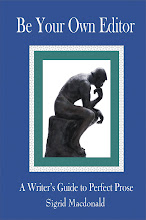You know what you want to say but sometimes it’s hard
to express. Try to imagine your reader. Could anything you’ve written be
ambiguous? Could it be confusing? Don’t assume that the reader knows what you
are thinking. Step back and fill in certain details or clarify to be as precise
as possible.
Take this sentence: “That ended her short life in
Shadow Lakes.” What ended her life there? Did she die or simply move? Or did
she stay but she never had a decent quality of life afterward? Think like a
reporter and ask yourself all the W’s: who, where, what and why (and, of course,
the non-W, how). Once you’re clear about those, convey them to the reader.
“Marrying Stephen ended her short life in Shadow Lakes
because they moved into the city right after their honeymoon.”
Sigrid Macdonald is an editor and the author of three books.
This is an excerpt from her last book, Be Your Own Editor, available on
Amazon: http://tinyurl.com/c3az54r


